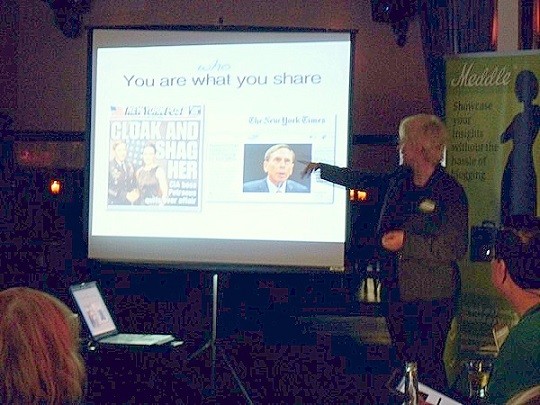Curation Sites Kuratur and Meddle Demo at April NJConnect Meetup

The April 17, 2013, NJConnect Meetup, held at Red in Red Bank, featured two local startups, Meddle and Kuratur, that are developing social content curation applications.
The congenial crowd in attendance was interested in the new ways of looking at, finding and prioritizing material from the Web, Twitter and Facebook.
NJConnect Meetup has been in operation since 2009 and is all about tracking tech and innovation in New Jersey, organizer Domenick Cilea said. Cilea provided a mini-roundup of the other tech meetups around.
A frequent promoter of the N.J. tech ecosystem, Cilea said Princeton Tech Meetup is more developer- and tech-focused, NJ Tech Meetup (Hoboken) “does a good job in hosting a broad range of speakers from the tech industry” and Jersey Shore Tech Meetup (Asbury Park) has an active scene. “If you like us here, you should definitely check out the other meetups,” Cilea told the group.
First up to present was serial entrepreneur Kirsten Lambertsen of Red Bank-based Kuratur (now in beta), who began working on her startup in 2012. The company went through an accelerator program in Rhode Island, reported here. Lambertsen acknowledged her technical cofounder, Brittany Jacobs, who was also at the meeting.
Curation is the act of sharing something that you didn’t create yourself, Lambertsen said, which people do every day. Some people believe you are what you tweet, she noted. “At Kuratur we take this a step further and say you are who you share,” she said.
Lambertsen noted that scandals, for example, are often shared and curated, but whether you share something from the New York Post or New York Times, selecting them says something about you.
Said Lambertsen, “This is really important, because people share [content] for very personal, emotional reasons. Who they share and what they share makes up what they want their identity to be out there in the world.”
Lambertsen said Kuratur’s market is any individuals with blogs who are attempting to establish themselves as experts. “We are trying to help people with blogs tell the world that they are the best at what they do,” she said. Kuratur users share “the Internet of people,” not one-off ideas, to create a trusted resource.
The site lets bloggers put together a page from Twitter, Facebook pages or RSS feeds from other bloggers or websites that are sources the blogger trusts. “You tell a story with that page. We update it as often as you want it to be updated,” she explained.
Lambertsen said she and Jacobs are working on WordPress plug-in integration for Kuratur, so users can export Kuratur updates to a page on a WordPress blog. Another new feature will be smart pingbacks, she said, which let content owners know you shared their information.
Presenting next was Meddle (Atlantic Highlands) cofounder Vidar Brekke, who discussed his social curation tool. Brekke agreed with Lambertsen that curation is a great way to establish expertise and that expertise is important for businesses. With social media, he noted, companies have to be transparent about what they are doing, or consumers will be transparent on their behalf.
“You can also do due diligence on your business references. You can find out who they hang out with and their work history … What is the scariest thing you can find out about a person?” Brekke asked, replying, “Nothing. If you find nothing, that’s a really scary proposition.”
People only go into business with individuals they trust, Brekke said. “The way to build trust is more than building a LinkedIn profile … The way you stand out today is to create some content.” Curation, he said, is a great way of doing that, by showing what interests you.
However, while most experts would like to publish, said Brekke, they often don’t have the time to compete with bloggers. For many, Twitter is too strange because of the character limit on expression. A lot of experts are not necessarily good writers, he added, and if they are, they can’t think of anything to write about or don’t have the time to do it.
To solve that, Meddle has come up with a hybrid social curation model. When experts read an interesting blog article, they can take a snippet from that blog post — the quote that is interesting to them — and react to it, fully crediting the original post.
“Most people who are real experts do have opinions. You need to give them something to engage with, to react to,” Brekke said. Experts are curating but also creating new microcontent in a different way than they would on Twitter or on a blog, he added. The newly created content can be shared on Twitter or Facebook, he noted. A Meddle page aggregates all those posts.
Judging by the questions from the group, the NJConnect audience was very interested in the two content curation sites and their different ways of approaching a similar issue.

